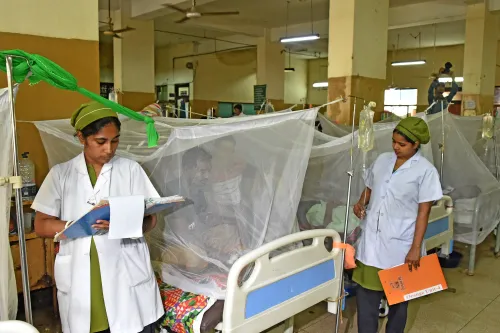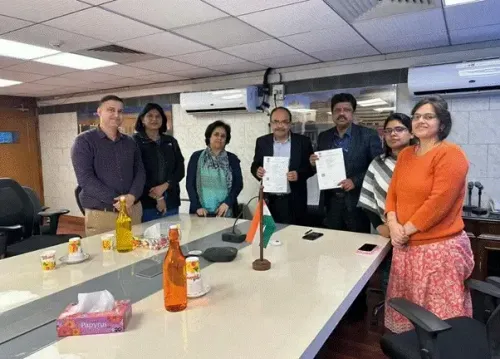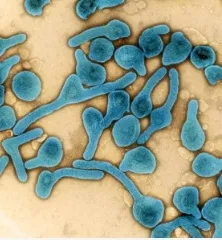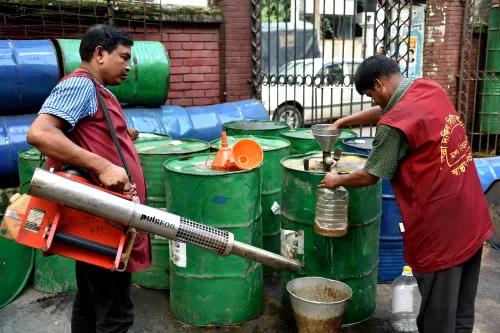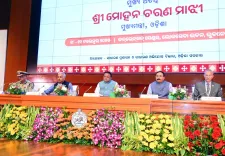Drone-Based Transportation of Human Corneas Could Transform Eye Care: ICMR
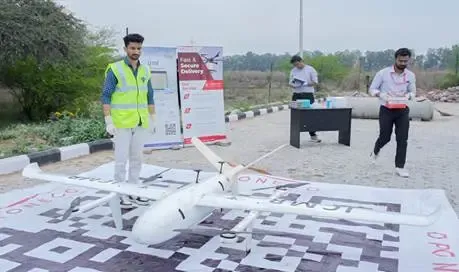
Synopsis
Key Takeaways
- Drone transport of corneas could enhance eye care access.
- Reduced transport time from 2.5 hours to 40 minutes.
- Part of ICMR’s i-DRONE initiative.
- Aim to improve logistics for medical supplies.
- Transformative for corneal blindness treatment.
New Delhi, March 25 (NationPress) The Indian Council of Medical Research (ICMR) has successfully showcased the capability of aerial transportation of human corneas using drones, a development that promises to transform eye care across the nation, particularly in rural regions, as announced by the Ministry of Health and Family Welfare on Tuesday.
This groundbreaking study examined the feasibility of utilizing drones for transporting delicate ophthalmic materials, such as human corneas and amniotic membrane grafts, from remote collection centers to advanced hospitals for transplantation in Sonipat and Jhajjar, Haryana.
According to the Ministry, “The drone effectively transported corneal tissue from Dr. Shroff’s Charity Eye Hospital (Sonipat center) to the National Cancer Institute (NCI), AIIMS Jhajjar, and then to AIIMS New Delhi.”
The drone covered the distance between the two locations in approximately 40 minutes, a journey that typically takes around 2-2.5 hours by road. It ensured optimal conditions for the integrity of the specimen, and upon arrival, the cornea was assessed, leading to a successful transplant surgery,” the announcement stated.
This pilot project was part of the ICMR’s i-DRONE initiative, initially developed during the Covid-19 pandemic to deliver vaccines to remote areas, and was launched in partnership with AIIMS New Delhi and Dr. Shroff’s Charity Eye Hospital, with support from the Ministry of Civil Aviation.
Dr. Rajiv Bahl, Secretary of the Department of Health Research (DHR) and Director General of ICMR, remarked, “This study on cornea transport represents a significant advancement—improving patient access, ensuring timely transplants, and alleviating the burden on crowded tertiary hospitals.”
“This initiative aligns seamlessly with the Prime Minister's vision of a self-sufficient India driven by innovation. Drone-based healthcare logistics are the future, and India is at the forefront of applying these technologies where they are most needed—saving lives and restoring vision,” he added.
Previously, the i-DRONE initiative has successfully demonstrated the use of drones for delivering essential medical supplies in regions like North East India (Covid-19 and UIP vaccines, medications, and surgical supplies), Himachal Pradesh (medications and samples in high-altitude and sub-zero temperatures), Karnataka (intraoperative oncosurgical samples), Telangana (TB sputum samples), and the NCR (blood bags and components).
Piyush Srivastava, Additional Secretary and Senior Economic Advisor at the Ministry of Civil Aviation, stated, “This collaboration between health and aviation sectors serves as an inspiring example of technology-driven social impact. Drones provide a scalable solution for prompt medical delivery in geographically challenging regions. As India enhances its drone ecosystem, studies like these are crucial for developing a resilient and responsive healthcare framework.”
Through this research, scientists aim to document operational workflows, pinpoint technical challenges, and provide evidence that supports the incorporation of drone logistics in routine medical practices—particularly for time-sensitive and temperature-sensitive biological materials like human corneas.
The results will inform future protocols, policies, and best practices for aerial transportation in healthcare.
“Corneal blindness affects millions in India, and the prompt availability of donor tissue is often a limiting factor. This drone-based transport model could represent a transformative step towards ensuring equitable access to vision-restoring surgeries, especially in underserved regions,” stated Prof. (Dr.) M Srinivas, Director of AIIMS, New Delhi.

